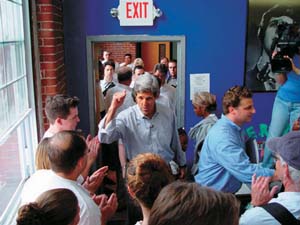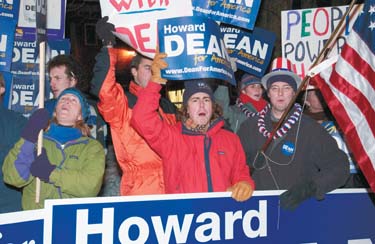 |
 |
| current issue |  |
past issues |  |
send a letter/news |  |
address update |  |
advertise |  |
about us |  |
alumni home |
Features
Only in New HampshirePage 3 of 3
 In August, a canvassing John Kerry greets UNH students.
In August, a canvassing John Kerry greets UNH students.
|
Students also draw conclusions about the candidates, for better or worse. Edwards "seems like he's on TV" even when you're standing right next to him, noted Jamieson Scott, a junior political science major whose opinions on campaign advertising have been quoted in the Boston Globe. On the other hand, he was favorably impressed by Wesley Clark's "gentleness," which he found surprising in a four-star general.
Matt Garascia '05, also a political science major, shook hands with all nine Democratic candidates over the course of the fall semester. "Whether you ask a question or just talk to them for a moment, you get an idea of how dedicated they are, how concerned they are," he says. "It's a way to look through a window at a candidate's character."
According to pollster Smith, it's a window with a pretty good view. "I don't believe voters vote on the basis of issue positions," says Smith. "Voters are looking for leadership qualities, and you won't find that in position papers. It doesn't come across on TV, and you don't get it in the newspaper. You get it by seeing them, talking to them, and talking with other people who have talked to them. Even in New Hampshire, not that many people meet a candidate, but they probably know somebody who has met that person and will tell them what they're really like. That second wave is very important."
Public spirit
The primary class, with its dozens of politically well-connected speakers, gave students many of those "second wave" glimpses of candidates past and present.
Matt Garascia was only 13 when Bob Dole ran for president in 1996, but he'll never forget a story Republican national committeeman Tom Rath told the class about campaigning with Dole, who had lost the use of his right arm while serving in World War II. "Tom Rath said it was one of the most courageous things he's ever seen--to watch Bob Dole tie his necktie with one hand. He wouldn't accept help. That was just the kind of strong-willed and independent guy he was."
That same year, a major snowstorm provided just enough adversity to reveal something of Tennessee Gov. Lamar Alexander's character to volunteer Sheridan Brown '99, then a freshman political science major at UNH. Although many events had been cancelled across the state, the candidate insisted on going out to meet his supporters. Driving a van for the press, Brown was following Alexander's car in the heavy snow. He remembers sliding around corners, "and at each stop a few more reporters decided to get out and take a cab back." Alexander pressed on, however, and soon several cars ahead of him spun off the road and into a guardrail. Alexander insisted on checking on the drivers, and gave one overwrought woman a ride home.
Alexander's kindness and integrity made a lasting impression on Brown, and influenced his choice of a career. He went on to work for John E. Sununu's reelection to Congress in 1996, and when Brown graduated in 1999, he landed a job as a case worker in Sununu's Congressional office. He now works as a projects assistant in Sununu's Senate office.
 UNH students working on primary campaigns and bussed-in supporters line College Road in a "visibility war" outside the Democratic primary debate.
UNH students working on primary campaigns and bussed-in supporters line College Road in a "visibility war" outside the Democratic primary debate.
|
It's the character of the people he has worked for that keeps Brown involved in government. "I make a distinction between public servants and politicians, who are driven more by personal ambition than the desire to serve," he explains. "I have been fortunate to work for people who have all been public servants."
Wrighton is gratified to see students like Brown following a path of public service. Both Wrighton and Smith hope their primary class will inspire others to follow that path, and Smith, always the pollster and prognosticator, predicts that six or 10 members of the class will end up in a politics-related career.
D-Day
It was standing room only in the MUB multi-purpose room when 1,000 people showed up to see Howard Dean in early October. Music blared from the loudspeakers:"We-e-e can . . . do the impossible!" On stage, poli sci major Jess Rudman '04 was about to do what seemed impossible to her: speaking in front of people. As president of the Generation Dean organization on campus, she was expected to introduce the candidate.
A tall young woman with a diamond nose stud and brown eyes that light up when she talks, Rudman had been out until 11 p.m. the night before with other Gen Deaners, using 10 buckets of chalk to advertise the rally on sidewalks all over campus. In campaign jargon, the Deaniacs had also been"flyering" and "postering." The resulting crowd standing before her was by far the largest group gathered to see any individual candidate on campus during the primary campaign.
So Rudman was pleased, but still feeling shaky about the introduction. At last Dean hopped purposefully onto the low stage. After a fleeting screech of feedback from the mike, Rudman found herself addressing the crowd easily, smoothly. The short speech was nerve-racking, "but I'm so glad I did it," she recalls. "After that, I canvassed, I knocked on people's doors, I called people on the phone." She spent hours "tabling" in the MUB, giving out information on Dean and voter registration.
Since 1952, only two candidates have become president without first winning the New Hampshire primary, and only two Democrats have been able to win the primary without taking Strafford County. "It makes you feel that your vote is more important," says Rudman. She used that statistic to convince others--no matter whom they supported--that their votes would really count. "I told my friends, 'You're living in the wrong state if you're not political.'"
In January, Rudman became an intern at Dean's Strafford County office, where she didn't mind putting in 16-hour days. With that kind of devotion, it's no surprise that she was heartbroken when Dean lost a sizable lead in the polls and came in second to John Kerry. But she is continuing as an intern with the state Democratic party, and she believes that "all the Democrats are trying to achieve the same objective, and eventually we're all going to be united." Her eyes still light up when she talks about the election. "I'm getting people aware, getting them out there, getting them to vote. There is a possibility that we're going to win an election in 2004, and that I'm going to have an impact." ~
Page: < Prev 1 2 3Easy to print version
blog comments powered by Disqus

